New TIPHC Exhibit, “The Road to Emancipation – From Jamestown to Juneteenth”
The Texas Institute for the Preservation of History and Culture will open its Juneteenth exhibit on Thursday, June 16 at 1 p.m. in the School of Architecture Gallery. Entitled, “From Jamestown to Juneteenth,” the display will trace the path of black slaves, who first arrived in the U.S. at Jamestown in 1619 as part of the Transatlantic slave trade, to their freedom in 1863 with President Lincoln’s Emancipation Proclamation. The path of slavery ended in 1865 when Texas slaves were finally given word of their freedom on June 19. The exhibit covers how the proclamation came to be, its effect on the Civil War, slavery in Texas, how the news of emancipation was received in the Lone Star State and why it took two and a half years to get here.
The exhibit is open to the public and will be on display through July 8. For more information, contact Michael Hurd, TIPHC director, at 936-261-9836, or mdhurd@pvamu.edu.
Related: Read the TIPHC Emancipation Proclamation and Juneteenth essay.
Historic Galveston Island Serves as the Birthplace of Juneteenth
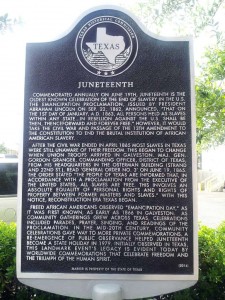 This year marks the 151st anniversary of Juneteenth, with a series of celebrations in Galveston including two parades, festivals, picnics, African-American heritage exhibits, concerts and much more.
This year marks the 151st anniversary of Juneteenth, with a series of celebrations in Galveston including two parades, festivals, picnics, African-American heritage exhibits, concerts and much more.
At the core of the events, which take place June 17-19, is the annual march from the steps of the Old Galveston County Courthouse to the Reedy Chapel A.M.E. Church at 2015 Broadway, which was originally known as the Colored Church. The Buffalo Soldiers – who are celebrating their 150th anniversary in July of this year – always participate in the historic reenactment of the first documented celebration of emancipation in Galveston, starting off by reading General Order No. 3 on the steps of the courthouse. To honor those who have served our country, veterans also have been invited to march along this year.
For more information, including other Juneteenth events in Galveston, click here.
Austinite, First African -American Chairman at Carnegie Hall
 From the New York Times: Robert F. Smith, the private equity titan who was named the richest African-American man by Forbes last year after making a fortune in software, also has a quirky musical side. He owns one of Elton John’s old pianos. He hired John Legend and Seal — and a youth orchestra — to perform at his wedding last summer on the Amalfi Coast. His youngest sons, Hendrix and Legend, are named after Jimi Hendrix and Mr. Legend. And he bought and refurbished a retreat in the Rocky Mountains that was beloved by jazz musicians, including Duke Ellington.
From the New York Times: Robert F. Smith, the private equity titan who was named the richest African-American man by Forbes last year after making a fortune in software, also has a quirky musical side. He owns one of Elton John’s old pianos. He hired John Legend and Seal — and a youth orchestra — to perform at his wedding last summer on the Amalfi Coast. His youngest sons, Hendrix and Legend, are named after Jimi Hendrix and Mr. Legend. And he bought and refurbished a retreat in the Rocky Mountains that was beloved by jazz musicians, including Duke Ellington.
On June 2, Mr. Smith’s intersecting worlds of money, philanthropy and music came together when he was named the chairman of Carnegie Hall, the nation’s most prestigious concert stage. He became the first African-American to hold the post at a time when diversity at leading cultural organizations lags — a recent survey of New York’s cultural institutions found that nearly 78 percent of their board members were white.
“Carnegie Hall is perfectly placed to champion not only artistic excellence, but also access and exposure to the best music in the world,” Mr. Smith said in a statement. (more)
Johnson Publishing sells Ebony, Jet magazines to Texas firm
 From the Chicago Tribune: After a 71-year run in Chicago, Johnson Publishing is getting out of publishing.
From the Chicago Tribune: After a 71-year run in Chicago, Johnson Publishing is getting out of publishing.
The company said Tuesday it has sold Ebony, its iconic African-American lifestyle magazine, and the now digital-only Jet magazine to Clear View Group, an Austin, Texas-based private equity firm, for an undisclosed amount. Michael Gibson is co-founder and chairman of African-American-owned Clear View Group.
Johnson Publishing will retain its Fashion Fair Cosmetics business and its historic Ebony photo archives, which remains up for sale. The deal, which closed in May, also included the assumption of debt.
A family-owned business throughout its history, Ebony has documented the African-American experience since it first hit newsstands in 1945. It has shaped culture ever since, coming into its own as it reported from the front lines of the civil rights movement during the 1960s in powerful photos and prose. (more)
Houston playwright’s work on Civil Rights pioneer featured at ‘Fade to Black’ competition
 Angela Rice, a 1991 graduate of Sterling High School, will be the only Texan among 10 finalists in this year’s “Fade to Black” national play festival that showcases the new works of African American playwrights. The plays will be performed at the fourth annual event at 8 p.m. June 16-18 at Queensbury Theatre, 12777 Queensbury Lane.
Angela Rice, a 1991 graduate of Sterling High School, will be the only Texan among 10 finalists in this year’s “Fade to Black” national play festival that showcases the new works of African American playwrights. The plays will be performed at the fourth annual event at 8 p.m. June 16-18 at Queensbury Theatre, 12777 Queensbury Lane.
Rice’s entry, “And A Child Shall Lead Them” is about a teenager, Claudette Colvin, whom Rice said “was denied her place in history” as a catalyst for the civil rights movement. On March 2, 1955, about nine months before Rosa Parks ignited a crippling bus boycott in Montgomery, Colvin refused to give up her seat to a white woman on a bus in the same city, said Rice.
Read the Houston Chronicle story about Rice. Click here for more information on the festival.
TIPHC Bookshelf
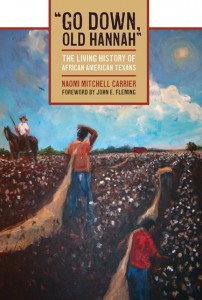 Published scholarship on black history in Texas is growing and we’d like to share with you some suggested readings, both current and past, from some of the preeminent history scholars in Texas and beyond. We invite you to take a look at our bookshelf page — including a featured selection — and check back as the list grows. A different selection will be featured each week. We welcome suggestions and reviews. This week, we offer, “Go Down, Old Hannah, The Living History of African American Texans,” by Naomi Mitchell Carrier.
Published scholarship on black history in Texas is growing and we’d like to share with you some suggested readings, both current and past, from some of the preeminent history scholars in Texas and beyond. We invite you to take a look at our bookshelf page — including a featured selection — and check back as the list grows. A different selection will be featured each week. We welcome suggestions and reviews. This week, we offer, “Go Down, Old Hannah, The Living History of African American Texans,” by Naomi Mitchell Carrier.
The fifteen living history plays in this collection were commissioned by museums and historic sites in Texas to show the interdependence of African American experiences and contributions to the living history of Texas. The plays cover subject matter ranging from slave celebrations, family breakups, and running away, to the Civil War, emancipation, and Reconstruction. Each play is research based and performed by Talking Back Living History Theatre as a festival production. These scripts are easily performed, and author Naomi Mitchell Carrier has included production notes in the overviews that precede each play. Lesson plans are also included, which add to the collection’s appeal as a classroom tool.
This Week In Texas Black History, June 12-18
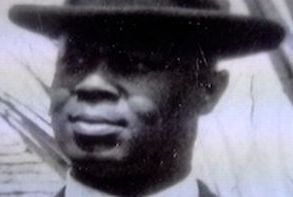 12 — James Leonard Farmer, Sr., who normally wrote his name “J. Leonard Farmer” on all of his publications, was born on this date in Kingstree, South Carolina in 1886. Farmer became Texas’ first black professor with an earned Ph.D (Boston University 1918), pastored churches in Texarkana, Marshall and Galveston and taught at Wiley College in Marshall (1919-20 and 1934-39) and Samuel Huston (later Huston-Tillotson) (1925-30 and 1946-56), in Austin. His son, James Farmer, Jr., was a noted Civil Rights activist and founder of CORE and was one of Wiley’s “Great Debaters.”
12 — James Leonard Farmer, Sr., who normally wrote his name “J. Leonard Farmer” on all of his publications, was born on this date in Kingstree, South Carolina in 1886. Farmer became Texas’ first black professor with an earned Ph.D (Boston University 1918), pastored churches in Texarkana, Marshall and Galveston and taught at Wiley College in Marshall (1919-20 and 1934-39) and Samuel Huston (later Huston-Tillotson) (1925-30 and 1946-56), in Austin. His son, James Farmer, Jr., was a noted Civil Rights activist and founder of CORE and was one of Wiley’s “Great Debaters.”
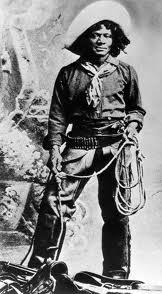 14 – In 1854, on this date, famous cowboy Nat Love, “Deadwood Dick,” was born as a slave on Robert Love’s plantation in Davidson County Tennessee. (Nat is pronounced “Nate.”) Love became proficient at breaking horses, and at age 15, headed west with $50 in his pocket to seek work as a cowboy. In Dodge City, Kansas, he met the crew of the Duval Ranch (south of Amarillo) at the conclusion of their cattle drive and returned with them to Texas to work at the ranch. The teenager quickly adapted to cowboy life and excelled as a ranch hand and a marksman with his .45 revolver. He earned the name, “Deadwood Dick,” after winning an all-around cowboy contest in Deadwood, S.D. The contestants competed in roping, bridling, saddling, and shooting and Love finished first in each category, walking away with the $200 prize and a new nickname.
14 – In 1854, on this date, famous cowboy Nat Love, “Deadwood Dick,” was born as a slave on Robert Love’s plantation in Davidson County Tennessee. (Nat is pronounced “Nate.”) Love became proficient at breaking horses, and at age 15, headed west with $50 in his pocket to seek work as a cowboy. In Dodge City, Kansas, he met the crew of the Duval Ranch (south of Amarillo) at the conclusion of their cattle drive and returned with them to Texas to work at the ranch. The teenager quickly adapted to cowboy life and excelled as a ranch hand and a marksman with his .45 revolver. He earned the name, “Deadwood Dick,” after winning an all-around cowboy contest in Deadwood, S.D. The contestants competed in roping, bridling, saddling, and shooting and Love finished first in each category, walking away with the $200 prize and a new nickname.
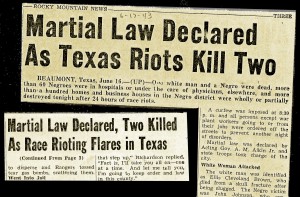 15-16 – On these days in 1943, the Beaumont Riots occurred. Conditions in the city were already tense because blacks and whites were competing for jobs in the shipyards because of World War II and because of a lack of enough resources, traditionally segregated facilities were forced to integrate. The situation escalated when a white woman reported being raped by a black man, though she was unable to identify the suspect being held at the city jail. However, on the evening of June 15 more than 2,000 workers, plus perhaps another 1,000 interested bystanders, marched toward City Hall, then dispersed into small bands and began breaking into stores in the black section of downtown Beaumont. With guns, axes, and hammers, they proceeded to terrorize black neighborhoods in central and north Beaumont. Many blacks were assaulted, several restaurants and stores were pillaged, a number of buildings were burned, and more than 100 homes were ransacked. More than 200 people were arrested, fifty were injured, and two – one black and one white – were killed. Another black man died several months later of injuries received during the riot. Beaumont was among several U.S. cities that experienced violent race riots that summer, including Detroit, Harlem, and Mobile, Ala.
15-16 – On these days in 1943, the Beaumont Riots occurred. Conditions in the city were already tense because blacks and whites were competing for jobs in the shipyards because of World War II and because of a lack of enough resources, traditionally segregated facilities were forced to integrate. The situation escalated when a white woman reported being raped by a black man, though she was unable to identify the suspect being held at the city jail. However, on the evening of June 15 more than 2,000 workers, plus perhaps another 1,000 interested bystanders, marched toward City Hall, then dispersed into small bands and began breaking into stores in the black section of downtown Beaumont. With guns, axes, and hammers, they proceeded to terrorize black neighborhoods in central and north Beaumont. Many blacks were assaulted, several restaurants and stores were pillaged, a number of buildings were burned, and more than 100 homes were ransacked. More than 200 people were arrested, fifty were injured, and two – one black and one white – were killed. Another black man died several months later of injuries received during the riot. Beaumont was among several U.S. cities that experienced violent race riots that summer, including Detroit, Harlem, and Mobile, Ala.
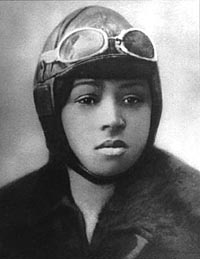 15 – On this date in 1921, Bessie Coleman, from Atlanta, Texas, became the first licensed black pilot in the world when she earned an international aviation license from the Federation Aeronautique Internationale. As a barnstorming stunt pilot, she became known as “Queen Bess” and “Brave Bessie.” In 1995, the U.S. Postal Service issued a stamp in Bessie’s honor and in 2000 she was inducted into the Texas Aviation Hall of Fame. The main road to Atlanta’s airport is named Bessie Coleman Drive.
15 – On this date in 1921, Bessie Coleman, from Atlanta, Texas, became the first licensed black pilot in the world when she earned an international aviation license from the Federation Aeronautique Internationale. As a barnstorming stunt pilot, she became known as “Queen Bess” and “Brave Bessie.” In 1995, the U.S. Postal Service issued a stamp in Bessie’s honor and in 2000 she was inducted into the Texas Aviation Hall of Fame. The main road to Atlanta’s airport is named Bessie Coleman Drive.
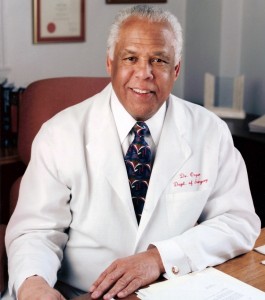 18 – On this day in 2005, renowned surgeon and educator Claude H. Organ, Jr. died in Berkeley, Ca. of heart-related problems at age 78. A Marshall native, Organ was accepted to the University of Texas medical school, but when the school discovered he was black, it offered to pay the difference in tuition for him to attend another school. He graduated from Xavier University a black college in New Orleans and later received a degree from Creighton University School of Medicine in Omaha. Organ developed two successful surgical residency programs, first at Creighton and later at the University of California/Davis-University of California, San Francisco East Bay Surgery Department. During his tenure at San Francisco he served as the first African American editor of the Archives of Surgery, the largest surgical journal in the English-speaking world.
18 – On this day in 2005, renowned surgeon and educator Claude H. Organ, Jr. died in Berkeley, Ca. of heart-related problems at age 78. A Marshall native, Organ was accepted to the University of Texas medical school, but when the school discovered he was black, it offered to pay the difference in tuition for him to attend another school. He graduated from Xavier University a black college in New Orleans and later received a degree from Creighton University School of Medicine in Omaha. Organ developed two successful surgical residency programs, first at Creighton and later at the University of California/Davis-University of California, San Francisco East Bay Surgery Department. During his tenure at San Francisco he served as the first African American editor of the Archives of Surgery, the largest surgical journal in the English-speaking world.
Blog: Ron Goodwin, author, PVAMU history professor
Ron Good  win’s bi-weekly blog appears exclusively for TIPHC/TBHPP. Goodwin is a San Antonio native and Air Force veteran. Generally, his column will address contemporary issues in the black community and how they relate to black history. He and the TIPHC/TBHPP staff welcome your comments. His latest blog is, “The “Roots” of the problem.” Read it
win’s bi-weekly blog appears exclusively for TIPHC/TBHPP. Goodwin is a San Antonio native and Air Force veteran. Generally, his column will address contemporary issues in the black community and how they relate to black history. He and the TIPHC/TBHPP staff welcome your comments. His latest blog is, “The “Roots” of the problem.” Read it
Submissions Wanted
Historians, scholars, students, lend us your…writings. Help us produce the most comprehensive documentation ever undertaken for the African American experience in Texas. We encourage you to contribute items about people, places, events, issues, politics/legislation, sports, entertainment, religion, etc., as general entries or essays. Our documentation is wide-ranging and diverse, and you may research and write about the subject of your interest or, to start, please consult our list of suggested biographical entries and see submission guidelines. However, all topics must be approved by TIPHC/TBHPP editors before beginning your research/writing.
We welcome your questions or comments via email or telephone – mdhurd@pvamu.edu.
